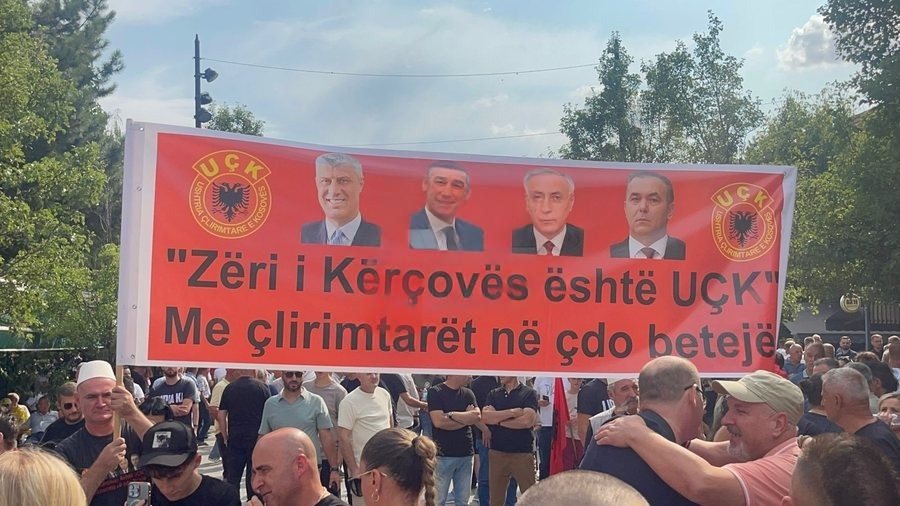Thousands protest in Pristina against Hague rulings on former KLA leaders amid anger at government

On Thursday afternoon, Pristina saw a massive protest against the Kosovo Specialist Chambers’ decisions on former Kosovo Liberation Army (KLA) leaders—an escalation of frustration with the Special Court that many view as deeply political and biased against the Kosovo’s war for independence. However, many saw in the protests an act of resentment against the Kosovo government, accused by veteran’s assciations of not doing enough to defend KLA figures in The Hague, who happen to be Albin Kurti and Vetëvendosje’s political rivals.
Why is this important: On Wednesday, the Hague court ordered former Kosovo President Hashim Thaçi to remain in pretrial detention. The same measure continues for Bashkim Smakaj, Isni Kilaj and Fadil Fazliu; they are accused, together with former Justice Minister Hajredin Kuçi, of obstruction of justice. The pretrial judge said continued detention was necessary and proportionate, noting that the risk of obstructing proceedings has not disappeared even after the closure of the war-crimes case against Thaçi.
Context: The judge added that reasonable suspicion remains regarding the offenses with which Thaçi is charged and cited actions indicating persistence in attempts to obstruct the Kosovo Specialist Chambers’ proceedings, including from within the Detention Center. Prosecutors say Thaçi’s influence over former KLA members and political circles underpins the obstruction case. The Specialist Chambers filed a second indictment for obstruction against Thaçi in December 2024.
At the protest, Hysni Gucati, head of the War Veterans Organization, denounced the ruling.
“The Special Court is distorting our history. They were the legitimate response of our oppressed people, against a criminal regime such as Serbia. Our war was not only a war for liberation, but a resistance against ethnic cleansing.”
The son of a fallen KLA fighter who addressed the crowd captured the frustration felt by the overwhelming majority of Albanians in the region, toward the Special Court.
“Today in my house, I have an open grave, my father’s grave. It is not only my house. My Kosovo and yours, has 1631 open graves. Many of those criminals responsible today are in The Hague testifying against our liberators.”
Ali Ahmeti—former National Liberation Army commander who led the 2001 uprising for Albanian rights in North Macedonia and later helped consolidate cooperation and interethnic harmony, and one of the region’s most respected Albanian leaders—appealed to Tirana and Skopje:
“I ask that the representatives of the Republic of Albania and the Republic of North Macedonia who are in the Council of Europe request a review of the 2012 CoE resolution, because it has been proven from many directions that there has never been trafficking of human organs by the KLA.”
Former Hague investigator Nevenka Tromp also addressed demonstrators, arguing that delayed justice amounts to denied justice and that selective justice is itself unjust.
In an apparent criticism of the Kosovo political class, Albanian Prime Minister Edi Rama questioned Pristina’s political response to the trials, asking:
“I continue to ask myself why the Assembly of Kosovo has not yet raised its voice through a resolution without party distinctions, where the many factual violations of the elementary democratic norm of due legal process by the Tribunal of The Hague would be listed, where the rights of Hashim Thaçi and his friends, isolated from the world for so many years now, have been kicked as if they were nothing at all?!”
He added that, if Kosovo’s Assembly adopted such a resolution, Albania’s Parliament would work to pass the same text and convey that message to democratic states funding the Tribunal.
Next steps: Organizers signaled further demonstrations unless detention decisions are revisited, while pressure builds on Kosovo’s institutions to take a stronger public stance in defense of due process for the accused.


